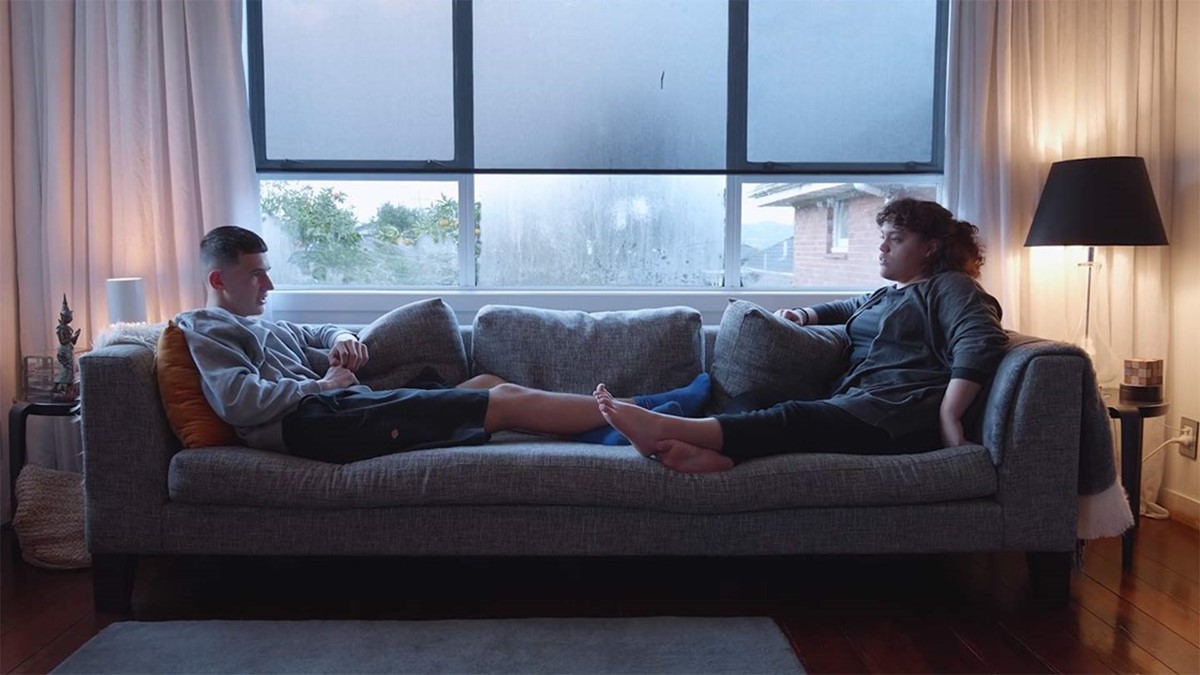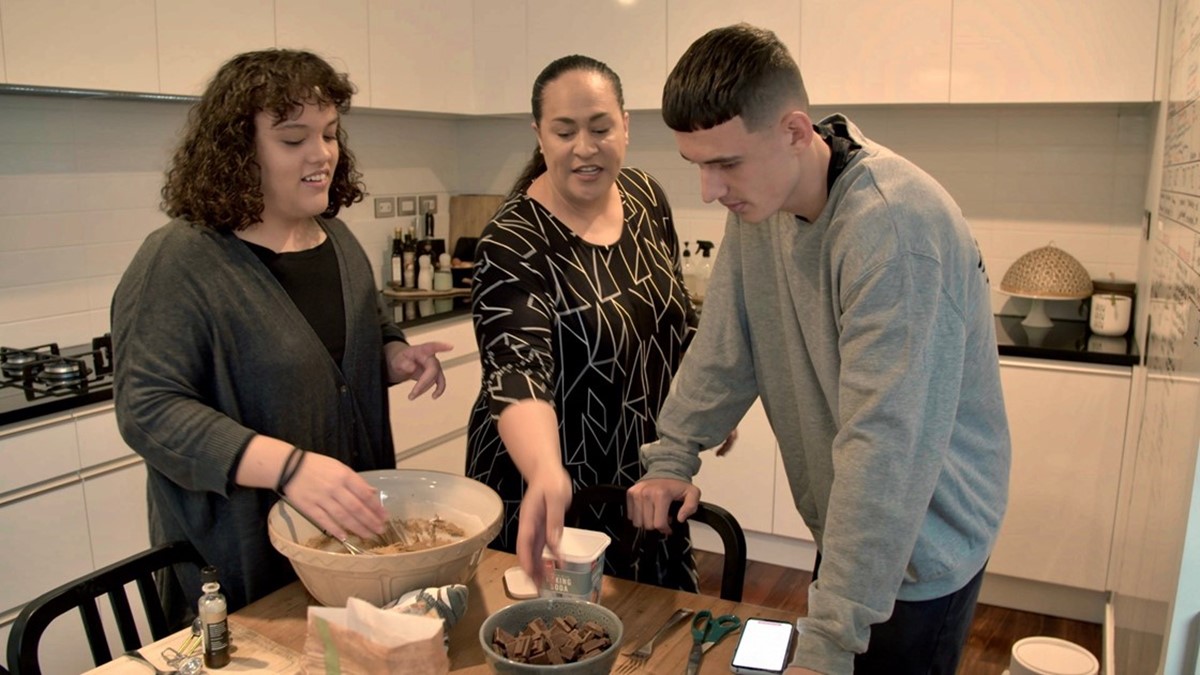
In My Mind: Teen Anxiety
What exactly is anxiety, and why is it more prevalent in teenagers now than in previous generations? Neuro Educator Nathan Wallis reveals why the brain is more vulnerable to anxiety during adolescence.



In My Mind: Dr Tom
Doctor Tom’s mission is to be the ambulance at the top of the cliff. By sharing his personal journey...
In My Mind: Dr Tom



In My Mind: Trailer
Living with mental health conditions
In My Mind: Trailer



In My Mind: Teen Anxiety
What exactly is anxiety, and why is it more prevalent in teenagers now than in previous generations?...
In My Mind: Teen Anxiety



In My Mind: Midlife Crisis
Middle-aged males often top mental health statistics. Here, Gen Xers and former comedians Willy de W...
In My Mind: Midlife Crisis



In My Mind: Breaking Point
To endure a breakdown at the pinnacle of your sporting career is tough. Former NRL star Paul Whatuir...
In My Mind: Breaking Point



In My Mind: Mana and Mateship
Lifelong best mates Matetu and Whare have both experienced depression, addiction and attempted suici...
In My Mind: Mana and Mateship



In My Mind: Starting the Conversation
Getting men to talk about their feelings is easier said than done, but one man is. Sam don Barber, a...
In My Mind: Starting the Conversation



In My Mind: The Early Years
NZ have the highest youth suicide rate in the world and men outnumber women four to one. There is no...
In My Mind: The Early Years



In My Mind: Burnout
Burnout is referred to as the overachiever's syndrome and is becoming increasingly common. Doctors a...
In My Mind: Burnout



In My Mind: Body
The pressure on women to be thin is everywhere. While environmental and genetic factors cause obesit...
In My Mind: Body



In My Mind: Mums
Motherhood is meant to be one of life's fulfilling experiences, so why are so many mums a mess? Prol...
In My Mind: Mums



In My Mind: Social Obsession
We're more connected than ever... always at the beck and call of our smart phones. But despite being...
In My Mind: Social Obsession



In My Mind: Huntington's
Rachel (41) and KJ (33) are two friends living with Huntington's, a fatal neurodegenerative disease....
In My Mind: Huntington's



In My Mind: Dominique
Dominique has survived for almost 12 years with severe anorexia and is determined to find a way to h...
In My Mind: Dominique



In My Mind: Rodney
Wheelchair dancer Rodney Bell was homeless on the streets of San Francisco for three years. Back hom...
In My Mind: Rodney



In My Mind: Psychosis
When reality blends with your imagination, life can be a living hell. Young people bravely share exp...
In My Mind: Psychosis



In My Mind: James
James is going back to work for the first time in ten years. After battling voices in his head and d...
In My Mind: James



In My Mind: Kiwi Farmers
Kiwi farmers are resilient men and women. But with tough economic times, isolation and stress, depre...
In My Mind: Kiwi Farmers
“It’s so much easier to be misunderstood online, people constantly stress about whether they are going to be taken the wrong way.”
“Social media doesn’t help.”
“There’s a lot of comparison between ourselves and our peers with our marks and how we handle things. And if you aren’t doing so well you get judged.”
These are just a couple of responses from teenagers at Burnside High School in Christchurch.

Social media has been blamed for the rise of anxiety and depression in adolescents but Nathan Wallis, a leading New Zealand Neuroscience Educator, believes it all comes down to resilience.
“It’s not that they’re weak," he says, "it’s that we’ve removed all of the resilience factors. In my generation, we had an at-home parent for the first year of our life.”
Nathan links the stability of the parent’s life to the teenager’s wellbeing, drawing on how divorce, separation and family deaths can impact the children. Factors such as having a parent at home for the first three years of a child’s life are like a building block of resilience, which sets the child up, and when these blocks are taken away, anxiety and depression can sneak in.
Karmella Reedy is 15 years old and has had anxiety since she was 12, her anxiety manifests itself both physically and mentally.
“For me, it feels like my heart is pushing up against my spine and I have overwhelming shudders of fear.”
“For me, it feels like my heart is pushing up against my spine and I have overwhelming shudders of fear.”
The feeling of potentially letting someone down and being an inconvenience cause her to worry. Karmella describes herself as a perfectionist, qualities she picked up from her mum.
Melina Reedy, Karmella’s mum, noticed her daughter getting worried despite her calm and confident countenance growing up.
“There are three things that stress her out, one would be her academic results, the second would be her friends and her third would be her cultural identity because she doesn’t know where she fits in. She’s still confident but for her to cope she has very specific specifics.”

Nathan Wallis has a solid understanding of the brain-power behind anxiety saying it's all about the lower brain taking over the upper part.
“The brain scan of a five-year-old is very similar to a 15-year-old, that’s when all of the activity is happening in the emotional brain. When you’re 15 the frontal cortex is shut for renovations, that’s why we see rates of anxiety, depression and suicide soaring in the adolescent years. So we just need to be their cortex for them.”
Karmella’s cousin Seth Adams is 15 and also has anxiety. His mum Karla links it to a period of the emotional trauma he went through losing his dad in his parent’s divorce and his grandma passing away shortly after. Seth was angry and felt he could not trust anyone, but found boxing a way to focus.
“The boxing has really helped because it’s taken him out of his room. Being in boxing has allowed him to build some confidence back.”
"If you’ve got a voice saying ‘you’re aren’t enough,’ you need to take control of that voice and master it.”
Nathan recommends a variety of techniques to manage anxiety including box-breathing, critical thinking and dream analysis, but says the most important one is taking control of the voice inside your head.
“A big part of growing up is realising that voice inside your head is meant to be your best friend, not a critical parent. If you’ve got a voice saying ‘you’re aren’t enough,’ you need to take control of that voice and master it.”



Being Me: William
Diagnosed with autism spectrum disorder and anxiety as a child, 25-year-old William Luskie is now an...
Being Me: William



Being Me: Jack
At 18, Jack Brown made a decision that would put him in a wheelchair for life. Facing his new realit...
Being Me: Jack



In My Mind: Breaking Point
To endure a breakdown at the pinnacle of your sporting career is tough. Former NRL star Paul Whatuir...
In My Mind: Breaking Point



In My Mind: Teen Anxiety
What exactly is anxiety, and why is it more prevalent in teenagers now than in previous generations?...
In My Mind: Teen Anxiety



In My Mind: Teen Anxiety
What exactly is anxiety, and why is it more prevalent in teenagers now than in previous generations?...
In My Mind: Teen Anxiety



Mike Chunn & The Long Black Cloud
Musical legend Mike Chunn brings together threads of the disability community in a campaign to use I...
Mike Chunn & The Long Black Cloud



In My Mind: James
James is going back to work for the first time in ten years. After battling voices in his head and d...
In My Mind: James



In My Mind: Adam
As a young man, Adam Bryce suffered from anorexia. It's been a tough road that's lead to depression....
In My Mind: Adam



In My Mind: Mums
Motherhood is meant to be one of life's fulfilling experiences, so why are so many mums a mess? Prol...
In My Mind: Mums



An Anxious World: Children Part 2
Despite being only weeks old when the Christchurch earthquake forced her family from their home, eig...
An Anxious World: Children Part 2



In My Mind: Starting the Conversation
Getting men to talk about their feelings is easier said than done, but one man is. Sam don Barber, a...
In My Mind: Starting the Conversation



In My Mind: Dominique
Dominique has survived for almost 12 years with severe anorexia and is determined to find a way to h...
In My Mind: Dominique



In My Mind: Psychosis
When reality blends with your imagination, life can be a living hell. Young people bravely share exp...
In My Mind: Psychosis



In My Mind: Mana and Mateship
Lifelong best mates Matetu and Whare have both experienced depression, addiction and attempted suici...
In My Mind: Mana and Mateship



In My Mind: Burnout
Burnout is referred to as the overachiever's syndrome and is becoming increasingly common. Doctors a...
In My Mind: Burnout



In My Mind: Body
The pressure on women to be thin is everywhere. While environmental and genetic factors cause obesit...
In My Mind: Body



Glimpse
One in five young people will experience some kind of serious mood disorder before the age of 24. Gl...
Glimpse



In My Mind: Arley
Teenager Arley Gower was diagnosed with anorexia three-years ago. It's a long road to recovery, but ...
In My Mind: Arley



In My Mind: Social Obsession
We're more connected than ever... always at the beck and call of our smart phones. But despite being...
In My Mind: Social Obsession



Being Me: Claire
Claire Freeman's achieved a lot since a spinal injury that put her in a wheelchair at 17, a design d...
Being Me: Claire



Model in Milan
Quadrapligic model, Claire Freeman makes her debut on the international catwalk at Milan Fashion Wee...
Model in Milan



In My Mind: The Early Years
NZ have the highest youth suicide rate in the world and men outnumber women four to one. There is no...
In My Mind: The Early Years



In My Mind: Kiwi Farmers
Kiwi farmers are resilient men and women. But with tough economic times, isolation and stress, depre...
In My Mind: Kiwi Farmers



An Anxious World: Children Part 1
Anxiety rates in NZ children are skyrocketing with the number of diagnosed cases more than doubling ...
An Anxious World: Children Part 1



Childhood Anxiety - Livestream with Nathan Wallis
Neuroscientist Nathan Wallis was on the couch with our panel of parents - Jason, Amanda and Sophia -...
Childhood Anxiety - Livestream with Nathan Wallis



In My Mind: Dr Tom
Doctor Tom’s mission is to be the ambulance at the top of the cliff. By sharing his personal journey...
In My Mind: Dr Tom



Being Me: Denise
Living with autism and anxiety disorder has made social connections difficult for Denise. But in a n...
Being Me: Denise



In My Mind TeenAnxiety
What exactly is anxiety and why is it more prevalent in teens now than in previous generations? Neu...
In My Mind TeenAnxiety



Being Me: Jack
At 18, Jack Brown made a decision that would put him in a wheelchair for life. Facing his new realit...
Being Me: Jack



Being Me: Joshua
Joshua Sade-Inia is a burns survivor. The scars, which cover almost half his body represent his ins...
Being Me: Joshua



In My Mind: Breaking Point
To endure a breakdown at the pinnacle of your sporting career is tough. Former NRL star Paul Whatuir...
In My Mind: Breaking Point



In My Mind: Teen Anxiety
What exactly is anxiety, and why is it more prevalent in teenagers now than in previous generations?...
In My Mind: Teen Anxiety



Mike Chunn & The Long Black Cloud
Musical legend Mike Chunn brings together threads of the disability community in a campaign to use I...
Mike Chunn & The Long Black Cloud



In My Mind: Adam
As a young man, Adam Bryce suffered from anorexia. It's been a tough road that's lead to depression....
In My Mind: Adam



In My Mind: Mums
Motherhood is meant to be one of life's fulfilling experiences, so why are so many mums a mess? Prol...
In My Mind: Mums



Being Us: Liam and Shane
Liam has Down Syndrome, and while technically Shane is teaching him life skills, Liam's the one who'...
Being Us: Liam and Shane



An Anxious World: Children Part 2
Despite being only weeks old when the Christchurch earthquake forced her family from their home, eig...
An Anxious World: Children Part 2



In My Mind: Starting the Conversation
Getting men to talk about their feelings is easier said than done, but one man is. Sam don Barber, a...
In My Mind: Starting the Conversation



In My Mind: Dominique
Dominique has survived for almost 12 years with severe anorexia and is determined to find a way to h...
In My Mind: Dominique



In My Mind: Psychosis
When reality blends with your imagination, life can be a living hell. Young people bravely share exp...
In My Mind: Psychosis



In My Mind: Mana and Mateship
Lifelong best mates Matetu and Whare have both experienced depression, addiction and attempted suici...
In My Mind: Mana and Mateship



In My Mind: Burnout
Burnout is referred to as the overachiever's syndrome and is becoming increasingly common. Doctors a...
In My Mind: Burnout



In My Mind: Body
The pressure on women to be thin is everywhere. While environmental and genetic factors cause obesit...
In My Mind: Body



Glimpse
One in five young people will experience some kind of serious mood disorder before the age of 24. Gl...
Glimpse



In My Mind: Arley
Teenager Arley Gower was diagnosed with anorexia three-years ago. It's a long road to recovery, but ...
In My Mind: Arley



In My Mind: Social Obsession
We're more connected than ever... always at the beck and call of our smart phones. But despite being...
In My Mind: Social Obsession



Being Me: Claire
Claire Freeman's achieved a lot since a spinal injury that put her in a wheelchair at 17, a design d...
Being Me: Claire



Model in Milan
Quadrapligic model, Claire Freeman makes her debut on the international catwalk at Milan Fashion Wee...
Model in Milan



In My Mind: The Early Years
NZ have the highest youth suicide rate in the world and men outnumber women four to one. There is no...
In My Mind: The Early Years



In My Mind: Kiwi Farmers
Kiwi farmers are resilient men and women. But with tough economic times, isolation and stress, depre...
In My Mind: Kiwi Farmers



An Anxious World: Children Part 1
Anxiety rates in NZ children are skyrocketing with the number of diagnosed cases more than doubling ...
An Anxious World: Children Part 1



Childhood Anxiety - Livestream with Nathan Wallis
Neuroscientist Nathan Wallis was on the couch with our panel of parents - Jason, Amanda and Sophia -...
Childhood Anxiety - Livestream with Nathan Wallis



In My Mind: Dr Tom
Doctor Tom’s mission is to be the ambulance at the top of the cliff. By sharing his personal journey...
In My Mind: Dr Tom



My Perfect Family: Jo & Leon
Young doctor Jo Scott’s career was on the rise when a brain haemorrhage changed her life. Seven year...
My Perfect Family: Jo & Leon
Watch, learn and be inspired
Get your favourite stories in your inbox.
Thank you for subscribing
You'll receive your first newsletter soon.
Sending...
{{ serverError }}

